Inside Matters
The gut health show – conversations with the most forward-thinking minds in health, fitness, science, nutrition and business. In-depth discussions about how our gut microbiome impacts our health, well-being, mood and more. Inside Matters was conceived by microbiome expert Dr James McIlroy as a platform to raise awareness of the importance of the gut microbiome. Our aim is to inspire and educate listeners around the world about the importance of gut health, equipping them with the knowledge they need to transform their lives for the better.
Episodes
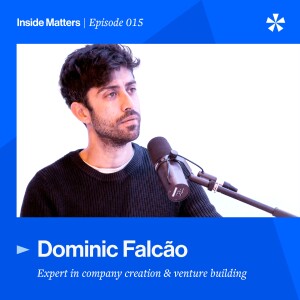
Thursday Mar 30, 2023
Thursday Mar 30, 2023
Learn more about Inside Matters - https://insidematters.health/
In this week’s episode, James has a lively discussion with Dominic Falcão about science, new technologies, starting and securing funding for tech companies and their personal philosophies and outlooks when it comes to development.
Dominic is a co-founder of Deep Science Ventures (DSV), a company that focuses on four key outcomes: restorative cultivation, scaling intelligence, reversing global heating and curative therapeutics.
He previously led Imperial College London’s science startup programme: worked with over 200 student companies, and supported a fraction of these to raise over £25m in funding within 3 years.
Dom admits to being obsessed with building new companies to solve the climate crisis, from carbon-neutral fuels and negative emissions technologies to market-side interventions to funnel more finance profitably into climate solutions. Via DSV, they are championing the diversity of background and vocation of focus in STEM education, starting with a global, diversity-led venture-focused science PhD programme.
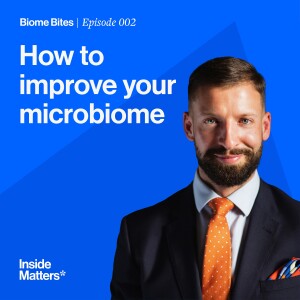
Thursday Mar 16, 2023
Thursday Mar 16, 2023
In episode two of Biome Bites James provides an overview of how to master your microbiome. Often asked how you can improve your microbiome diversity and gut health, James covers a wide range of topics including microbiome-friendly eating and how the food you eat is processed by the gut, probiotics, mindset and easy lifestyle changes you can make to improve your microbiome.
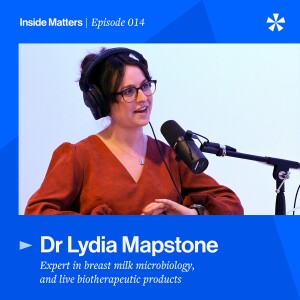
Thursday Mar 02, 2023
Thursday Mar 02, 2023
Learn more about this episode's guest and the topics discussed - https://insidematters.health/
Dr Mapstone is co-founder and CEO at BoobyBiome, a biotechnology company developing live biotherapeutic products to improve and protect infant health. BoobyBiome are seeking to achieve this by rationally designing microbial therapeutics from the beast milk microbiome. Dr Mapstone holds a PhD in Synthetic Biology from UCL.
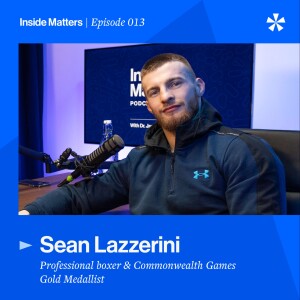
Thursday Feb 16, 2023
Thursday Feb 16, 2023
Learn more about the podcast - https://insidematters.health/
Sean Lazzerini is a professional boxer and 2022 Commonwealth Games gold medalist. He started boxing at the age of 12 and quickly started to win fights. He took a short break for a couple of years during his mid-teens while at school but restarted at age 17 and progressed from there. He became a professional boxer towards the end of 2022 in the light heavyweight category following on from his success at the Commonwealth Games.Sean trains six days a week. He has built a great team around him that includes Ricky Burns, three-time world champion. On four out of the six days, he trains twice a day, and on two of the six days, he trains three times a day. His training is predominantly boxing-specific but also includes running and weight training. Sean also undertakes hot and cold therapy using a sauna and a plunge pool most days of the week. He sees this is a fundamental aspect of his recovery programme.Sean has had setbacks including injuries and losses. One example that was discussed was a hand injury that prevented Sean from going to the Olympics. Being able to overcome adversity successfully is a key trait of a champion.Over the course of the podcast, Sean and James dug deep into the world of being a professional athlete and boxing. Topics included: the mindset of a champion, what happens before and after a fight, making weight, drugs and alcohol, sports in Scotland and creating a good diet.To learn more about Sean and/or to follow his journey see https://www.instagram.com/lazzaboy_beastmode/
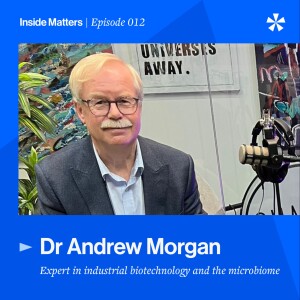
Thursday Feb 02, 2023
Thursday Feb 02, 2023
Learn more about the podcast here - https://insidematters.health/episodes/dr-andrew-morgan
Dr Andrew Morgan is the former Chief Scientist of DuPont Nutrition & Health. He has forty years of experience in biosciences innovation in major global science-based companies spanning nutrition, health and agri-food.He is actively involved in supporting microbiome innovators and researchers as well as the wider industry through his role as Chair of the Innovate UK KTN Microbiome Innovation Network Advisory Board. He also serves as a Royal Society Entrepreneur in Residence at the University of Exeter.
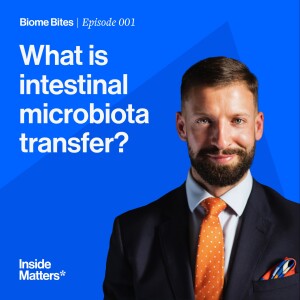
Thursday Jan 19, 2023
Thursday Jan 19, 2023
In this episode, James provides an overview of a medical procedure called intestinal microbiota transfer (IMT), also known as a ‘stool transplant’ or ‘faecal microbiota transplantation (FMT)’ amongst other descriptive nomenclature.
IMT involves the transfer of microorganisms into the intestinal tract of a recipient with the intention of modulating the microbiome in the recipient in a positive manner, and in turn, influencing disease processes and health in a positive manner. James describes a brief history of IMT, the various forms of IMT and how the procedure has evolved over time.
Transcript:
00:00:00:03 - 00:21:05:48
Hello, everybody. It's James here. And this is the first Biome Bite. The Biome Bites are shorter. Podcasts hosted by me and in Biome Bites, I’m the only guest, so essentially it's just me talking to you as the listener.
Today's episode will focus on something we've talked about a lot on the podcast, something called fecal microbiota transplantation, also known as FMT.
You may have heard of it referred to as stool transplantation, poo transplantation. Intestinal microbiota transfer, intestinal microbiome transplantation and potentially even other things I may not be aware of. And you've probably thought, what is that? You may have heard of it before and you want it and want more information.
So in today's Biome Bite we're going to give an overview of FMT, also known as IMT. If you refer to it as intestinal microbiota transfer, which is my preference and I'll get on to that in this episode. In subsequent Biome Bites relating to FMT, IMT, I'll dig deeper and talk through the latest evidence as well as how the industry is developing. So let's start with the basics of the basics.
What is FMT IMT?
FMT, and I'll just refer to it from now on in this episode as FMT is a medical procedure in which microorganisms are moved into the intestinal tract of a recipient with the intention of preventing treating, curing a disease or a condition.
Now, where do the microbes come from?
The microbes come from the stool, hence the name fecal microbiota transplantation. And that stool can either be derived from the person who's receiving the FMT, as in it's coming from themselves and going into themselves. And that's called an autologous FMT.
Or it can come from a related, unrelated, healthy, some cases even unhealthy. And I'll get to that in a later episode, the donor and in this case, when it's not come from the person who's receiving the microorganisms which are derived from the stool, it's called allogeneic. And you can look up the definitions of those words, but essentially they relate to the source of the material that's been moved in to someone else.
We also see in the case of allogeneic, it can come from more than one donor, so it can be mixed. I've seen in the medical literature it coming from up to seven donors in a trial in which they administered FMT to patients suffering from ulcerative colitis, a form of inflammatory bowel disease.
So I think it's important to understand that it's a procedure and it's not a medicinal product in itself. What's medicinal about FMT is the microorganisms that are being administered as part of the procedure.
Now we can ask ourselves, when did FMT first originate? Who was the first person to do it?
And the answer to that question is, is not actually that clear. And it's probably much older than you might think. So in 2022, we're doing FMT routinely for patients suffering from nasty infections associated with a bacterium called C difficile, also known as Cdif.
There's also been a large number of clinical trials in other disease areas like ulcerative colitis, as I just mentioned, but also irritable bowel syndrome, IBS. And patients suffering from various different types of cancer as a means of improving how they respond to cancer drugs. And that's just a very, very small segment of all the possible indications in clinical trials.
So actually, the first recorded cases of FMT seem to originate back to ancient China, probably fourth or fifth century. And they prescribed this suspension of microorganism called yellow dragon soup.
In other areas of medicine, such as the veterinary world, FMT is performed reasonably routinely as a means to treat mastitis, for example, and colitis in horses and cows. And you may also be aware of the fact that some animals perform something called coprophagia. Essentially the consumption of feces as just part of being themselves.
Why do they do that?
I think there's lots of different theories, but what I'm trying to say is it's not totally unprecedented for mammalian species, i.e. humans and others, to essentially get microbes from other sources to potentiate or improve their health and well-being. And it might be that we've actually evolved to benefit from the consumption of microorganisms in this manner.
So you might be wondering how do the microorganisms get into the patient? How is it administered? How is it prepared, so and so on?
And I'll give a high-level overview of all of that now and in later. Biome Bites will cut out sections of the whole process of finding a donor and administering the microorganisms and what happens after cut it up and then do deeper dives into each individual area so, a donor provides a stool sample.
And that donor, typically, if they're not related to the patient, would undergo a series of screening tests to make sure that they're free of disease. And there if they're related to the patient, some people, some clinicians, whoever is providing the FMT or at least providing the material that's used to manufacture and ultimately produce the microbes that are used in FMT, take the view that if they're related to the recipient, then there's less of a need to screen because they live together.
And as a result of that, they are probably carrying the same bugs. Now, that said, the more and more we understand about FMT the more and more realize that donor screening is fundamental and extremely important in the context of making sure that what's being administered is safe. And even if donors are relatives now typically they're screened in the same way as an unrelated person would be.
So what does this screening involve?
Well, it's trying to reduce the risk as far as practically possible of an objectionable organism, also known as a pathogen being present within the stool donation and reducing the risk as far as possible of the kind of global microbial community profile being pro-inflammatory or being conducive to the development of a microbiome mediated disease.
What do I mean by that? And what I mean by that is that we have observed that the microbiome changes in large numbers of patients with diseases?
I'll just name a few. Multiple sclerosis, obesity, type two diabetes. And it may be that these changes that we've observed are actually driving the disease processes. Therefore, you probably wouldn't want to transfer microorganisms from someone suffering from type two diabetes into someone suffering from something else, because you might then trigger processes that could ultimately lead to type two diabetes.
If you see what I mean and there's no easy way of characterizing that other than making sure that the donor doesn't have type two diabetes.
So there's a whole raft of questionnaire-based screening procedures and questions that exist to reduce the theoretical risk of the transfer of microbiome-mediated disease through the microorganisms that are administered as part of FMT.
The other elements relate to objectionable organisms, pathogens. And what we do is we ask people if they've traveled. We ask about their sexual history. We ask if they currently have an infection or the feeling well fit and healthy on the day of donation. So and so on. We also extensively screen their blood and extensively screen their stool.
And you might be thinking some of that sounds quite familiar. It sounds a little bit like blood transfusions and what I've done or what I've heard people do as they go to donate blood. And there's a lot of parallels actually, between donors for FMT and Donors for blood transfusion. Now, the purpose of this Biome Bite is to give a high level overview.
So I'm going to kind of stop there and not go any deeper into what kind of pathogens we look for, what kind of tests we do, how frequently do we do it. That will form the basis of a much more detailed discussion at a later date. So we've tried to make sure that the microorganisms are safe.
We've talked about it coming from a patient in the form of an autologous procedure or a donor or multiple donors in the form of an allogeneic procedure. The benefits of an allogeneic procedure, for example, over an autologous is that you might be trying to change the microbiome in a particular kind of way that possibly couldn't be achieved if you're just giving yourself your own microorganisms back.
Now, how are the microorganisms manufactured? Do they just sort of take a stool sample and do one or two things and then trying to get it into the patient? Or do we do a large number of different manipulations and processes?
So historically, we had a rather unsophisticated, quite crude methodology, and it was really just about getting the stool sample into suspension. Now you might be thinking, Well, if it's just into suspension, why do not just get runny sort of diarrhoea type stools? Well, the reason we don't do that and we have cut offs is related to something called the Bristol Stool score or the Bristol stool chart.
And the cutoffs really relate to is this person is potentially constipated or does this person have diarrhoea. And we wouldn't accept either, because constipation and diarrhoea can be proxies for infections or problems within the gut that might make the microorganisms essentially unsafe in the context of FMT.
So historically, it used to just be about creating a suspension
What we now try and do is try and remove the non-microbial components, so basically fibres from the stool sample and try to basically distil down to the microorganisms only. The stool is actually quite a complicated substance that includes undigested foods, a variety of microorganisms, bacteria, viruses, fungi and small viruses that infect bacteria called bacteriophage, as well as other components that you may have ingested. For example, in smokers, sometimes you can find ash in stools and things like mucus and antibodies, colonocytes, which are elements of the inner lining of the intestine, so and so on.
So the purpose of the processing is to try and distil down or maybe distil is the wrong word.
But what we're trying to do is remove the microbes and the microbial elements from the non-microbial elements, because it's the microbial elements that we're most particularly interested in the context of FMT, because we're trying to change the recipient's microbiome.
So how do we do that? We do a series of processing steps under typically controlled conditions. We want to, as best as possible, replicate the intestinal environment, which is anaerobic, so oxygen-free. And interestingly, we want to protect the microorganisms that have been donated as much as possible and keep them alive, which is very different to a traditional pharmaceutical manufacturing process where you don't want there to be any bacteria in there at all. Sometimes you want it to be completely sterile if you're injecting it, for example, in someone's vein.
So what we want to do is not only keep the microorganisms alive, but we also want to make sure that no microorganisms from the environment can enter into the sample. So it's quite complicated and quite challenging.
The suspension of microorganisms then goes through subsequent processing steps and typically these days is either stored frozen as a suspension or is taken through some sort of drying process where the aqueous component is removed. And we produce a powder.
Historically, and it doesn't really happen so much anymore, Processing would happen essentially on the day of donation and recipients would get the FMT the same day. And that's typically described as being fresh versus frozen. I'm not so keen on the fresh nomenclature, but you kind of get the picture.
It's done on the day and it's not stored, frozen or banked Earlier on in the field of FMT we did a lot more on-the-day type processing rather than storing anything and then giving it at a later date. So instead of creating a bank or an inventory of processed material that could be administered, it was typically done on the day. And that's because no one had really compared to see if a frozen sample is less effective or more effective than a fresh one.
And typically what was seen in the scientific literature and research was that Frozen was pretty much as good as fresh in the context of a C difficile infection or prevention of recurrence of C difficile infection. So based on that, people started to do frozen a lot more and we started to move away from relatives to anonymous type donors. There's also benefits associated with anonymous donors as well.
What happens after we've managed to distill the microorganisms and either produce the frozen suspension or produce the powder?
Typically the powder is encapsulated and FMT as a procedure is associated with a number of medical procedures, like a colonoscopy, which is a tube that goes up the back passage like a nasal gastric nasal duodenal.
The first part of the small intestine or nasal mid-part the small intestine tubes, which go up the nose through the stomach and into these parts of the intestine. And the microorganisms are essentially pushed into the patient through these tubes. And they arrive at some point in the intestinal tract where if it's going up the back passage, it's going into the colon, the large bowl, if it's going from top to bottom, it typically goes into the bottom part of the stomach or to the small intestine.
And there's been a variety of research over the last ten years comparing upper GI delivery versus lower GI delivery. What's more effective? What's less effective? So and so on. Typically, the evolution has been from an enema or nasal duodenal through to a capsule, which is typically what we're doing now
Some clinicians prefer colonoscopy because you can also visualize the colon at the same time, and that's quite useful. In things like C difficile infection or colitis, where visualizing the inner aspect of the colon gives you an indication of how severe the patient's condition disease infection actually is.
That's the most established use case. Interestingly, in terms of history, I think that the first recorded case of FMT in modern medicine, which was published in 1958 by a gentleman called Mr. Ben Eiseman, the chief surgeon at Denver General Hospital. He administered FMT probably for patients suffering from C Diff although it wasn't really known as C Diff at the time.
And there was a little bit in the in the literature following on from that in patients with ulcerative colitis. But we didn't really see that much FMT until 2013 when there was a landmark randomised controlled clinical trial, the gold standard of medical evidence which essentially showed that FMT plus antibiotics in these patients who had an overgrowth of C difficile, a nasty hospital acquired bug. typically hospital acquired bug did much better than patients who just received antibiotics alone.
And it kind of broke the cycle of patients who were getting recurrence. So what was happening with these patients as there were too many bad bugs in the case of C difficile, too little good bugs. So there was like too many weeds in the garden. Those bad bugs were producing toxins. The toxins were inducing inflammation. Sometimes the patients were going on to die and if they were treated with antibiotics, they got the FMT, after which replenished the garden with all the healthy, with all the healthy plants. And as a result, the weeds couldn't grow and out-compete and take up all those biological niches.
So that trial spurred a huge wave of interest in FMT. It catalysed lots of funding, company formation. And since then we've seen hundreds of clinical trials, hundreds of publications and many companies and patents filed following on from them.
Okay, so why would somebody need an FMT? Why would someone benefit from an FMT? Why is it done really for anything?
So each of us has something called a microbiome, a term used to describe communities of microorganisms, their collective genomic potential through all of their genes and their theatre of functional activity and essentially what we now know is that changes to the microbiome in terms of composition and function are associated with likely contribute to and in some cases are probably the cause of development of disease, some of which are really underserved in terms of treatment options.
So the theory, the thinking is that in patients with microbiome perturbance the change and disease linked to changes to the microbiome, if we can change their microbiome back to a healthy state, then we might be able to alleviate symptoms and ideally cure the disease, which is currently incurable based on currently available medical therapies. And there's a variety of different ways we can change our microbiome.
But FMT represents one such avenue that is quite dramatic. We're taking something communities from a healthy person or from someone before they've had a disease or change in the case of autologous FMT and giving it back to them. So it's a rapid sudden change to their microbiome reversion, hopefully back to something that's healthy. The human colon is an incredibly efficient fermentor system, and within each stool that we produce, roughly 50% of it is microbial. One times 10 to the 12 bacteria.
Think about how many zeros that is per stool donation. So it's it is a really incredible, well, efficient way to capture large numbers of potentially therapeutically active bacteria before instilling them into someone else. So what have we talked about?
We've talked about what FMT is, we've talked about how the microorganisms instilled through FMT are typically prepared and stored.
We've talked about how the microorganisms are administered and we've also talked about essentially the most well-established indication for FMT in the form of C Difficile infection. We've also brushed on some of the history, which is really extremely interesting, and I think that's probably a good overview for now.
And in later Biome Bites, we're going to dig deeper in each of these key areas. I hope you've enjoyed this brief overview of what is FMT. If you have questions, please feel free to send them to me. or tweet, connect with me on social media. I'd be very happy to try and answer them on a subsequent podcast.
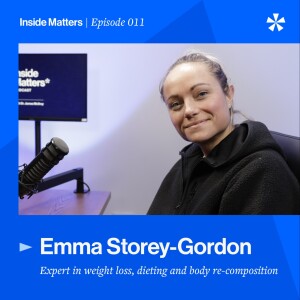
Thursday Jan 05, 2023
Thursday Jan 05, 2023
Emma is a fitness coach, sports scientist and researcher with a large following on social media and multiple successful online businesses.
Through structured programmes and coaching, Emma has helped thousands of people lose weight and improve their body composition. She understands the science underpinning successful diets and uses her knowledge to help other personal trainers and coaches help their respective clients.
To find out more about Emma’s products and businesses, check out: https://esgfitness.co.uk
This episode is full of recommendations and knowledge relating to how to improve your physique and live a longer, healthier and happier life. When asked to distil her top recommendations, Emma came up with the following advice:
Eat in accordance with your energy demands
Eat primarily whole foods, limit processed foods
Reduce snacking to a minimum
To give context to the above, Emma noted that it was challenging to figure out exactly what your energy demands are. No calorie calculator / energy demand calculator is going to be entirely accurate. Emma suggests tracking your food and body weight for a period of time and using this as a basis to make adjustments. Daily fluctuations in weight are not important due to water fluctuation and varying food intake. Weekly / monthly fluctuations in weight are important.
The concept of eating minimally processed foods has been discussed several times on Inside Matters and is sound advice for someone wanting to improve their body composition and the composition of their microbiome.
On the subject of snacking, Emma’s view is that this is one of the primary reasons for people being unable to lose weight or a reason for putting on weight. Snacking can be mindless and instinctive e.g a biscuit with coffee in the office or finishing a plate of food for the sake of finishing a plate of food and not being wasteful.
Beyond her big three tips, a lot of Emma’s advice centred around what she calls ‘showing up’, essentially, how you approach a task or your day. How you show up dictates how you perform and how others respond to your actions. Exercise helps Emma show up at her best, and the benefits of exercise for her extend beyond physical health and into performance at work and in life.
Her morning routine is as follows:
Wake up at 05:45, put the kettle on
Undertake 10 pull-ups and push-upsTry not to open emails until 7 - be mindful
07:30 gym
09:00 start work
On supplements, Emma recommends fish oil, vitamin D, creatine and B12. Creatine is particularly beneficial for people that do not eat animal products - most notably red meat.
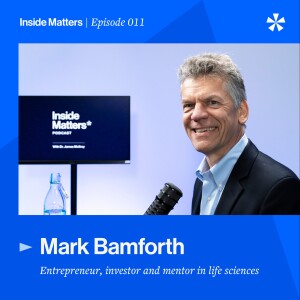
Thursday Dec 22, 2022
Thursday Dec 22, 2022
Mark R. Bamforth is an entrepreneur, investor and mentor in life sciences. Mark has founded, built, and sold three contract development and manufacturing organisations (CDMOs) over the last 12 years.
His first company, Gallus Biopharmaceuticals, focused on monoclonal antibodies. His second company, Brammer Bio produced viral vectors for gene therapies. His third company. ArrantaBio, produced advanced therapies, including microbiome therapeutics.
Previously, Bamforth spent 22 years at Genzyme, latterly running global manufacturing operations. His career began as a petroleum engineer with Britoil, then as a chemical engineer with Whitbread.
Bamforth serves on the boards of Continuus Pharma, EnteroBiotix, Inceptor Bio, Pneumagen, and Entrepreneurial Scotland. He has a BS in Chemical Engineering from Strathclyde University and an MBA from Henley Management College.
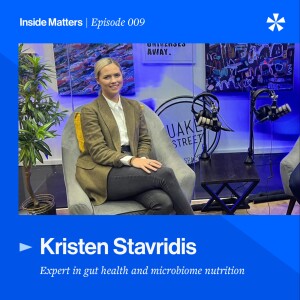
Thursday Dec 08, 2022
Thursday Dec 08, 2022
Visit our website for full show notes and guest information - https://insidematters.health/episodes/kristen-stavridis
Kristen Stavridis is a nutritionist and speaker based in London who focuses on gut health and how we can improve this through healthy eating and lifestyle. She is also the creator of The Gut Health Programme, a programme which has helped over 800 people improve their gut microbiome and overall well-being. Her main aim is to help educate people both on social media and in person about how important diet is and its importance in improving our gut and digestion.
To learn more about Kristen, you can follow her on social media: @thatnextlevelgirl
For rapid improvements to gut health and the microbiome, Kristen recommends her ‘gut reset diet’, in which gluten, alcohol, coffee, dairy and processed sugars are cut out completely for 30 days. Following this, her recommendation is to adopt a 70:30 and 80:20 approach in which 30% or 20% of the diet/lifestyle is relaxed and 70% or 80% is ‘on plan’. As part of the gut reset protocol, Kristen also recommends that her clients take a symbiotic - a combination of a prebiotic and a probiotic.
Beyond the gut reset diet, the simplest and most effective change to make to support your microbiome and gut health is to convert to a predominantly plant-based diet and eat a variety of plants every day. Kristen recommends properly washing fruits and vegetables due to pesticides being present on the surface of the food. To do this effectively, Kirsten has developed a process in which vegetables and fruit are put into a clean sink filled with water that has been supplemented with a tablespoon of baking soda and apple cider vinegar for 12-15 minutes.
Kristen recommends avoiding sugar-free/artificially sweetened drinks as these have demonstrably negative impacts on the microbiome.
1:20 bloating
2:10 what is the gut
6:15 gut health symptoms
8:10 gut health influencers
11:17 Kristen's journey and the gut health programme
18:38 gut health programme results
22:15 bloating
25:50 gut health and social media
30:52 Home microbiome testing (good clip)
34:30 Best microbiome foods and diet
38:55 GMOs and red meat
41:06 The microbiome and the skin
49:24 cravings and the microbiome
52:33 dietary plans on the gut reset diet
1:01:32 Prebiotics and probiotics
1:06:14 protein supplementation
1:07:22 Artificial sweeteners and sugar-free drinks
1:13:18 Juice diets
1:17:57 Kristen's diet
1:24:00 FODMAP diets
1:26:30 Stress
1:29:11 Vegetarian / vegan diets
1:30:40 Gut health basics
1:35:17 Mushroom
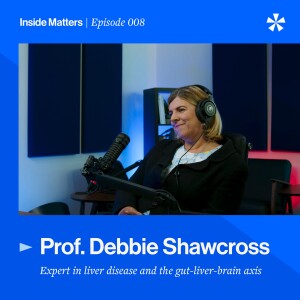
Thursday Nov 24, 2022
Thursday Nov 24, 2022
Learn more about the podcast here - https://insidematters.health/episodes
Debbie Shawcross is a clinician scientist and Professor of Hepatology and Chronic Liver Failure at Kings College London. She is a global key opinion leader in hepatic encephalopathy (HE) and has a specific research interest in why patients with advanced chronic liver disease are susceptible to developing an infection. Professor Shawcross also leads the gut microbial manipulation and chronic liver failure laboratory (Shawcross Laboratory) in the James Black Centre, Kings College London.
She is the Chief Investigator of the National Institute for Health Research (NIHR) EME-funded PROMISE Trial investigating faecal microbiota transplantation as a treatment for patients with alcohol and metabolic-related cirrhosis and Principal Investigator of the EU Horizon 20:20-funded MICROB-PREDICT Trial.
Liver disease is a growing problem globally, with 40% of adults alive today having excess fat accumulating in their livers. This condition, called fatty liver disease, is a starting point for a range of liver diseases including cirrhosis (scarring of the liver) and liver cancer.
There is a known link between the gut, liver and brain. These connections and interrelationships are called the ‘gut-liver-brain axis’. The liver and the blood are connected anatomically through the hepatic portal vein. The gut and the brain are connected anatomically through a nerve called the vagus nerve. More generally, the organs are connected through metabolites and signalling molecules produced by the gut microbiome that can travel in the blood.
Multiple studies that have been conducted in humans and animals have shown that the microbiome plays a fundamental role in the development of liver disease and is therefore a promising potential target for prevention/treatment. In the episode, Professor Shawcross provides an excellent overview of what changes to the microbiome occur and why these are important. Briefly, in patients with liver disease, there is lower bacterial microbiome diversity (fewer species) and within the species that are residing, there are relatively higher proportions of bacteria that cause inflammation, as well as bacteria that are resistant to antibiotics (multi-drug resistant organisms ‘MDROs’). Additionally, in liver disease, a barrier that prevents bacteria from seeping out of the intestine into the blood/body becomes damaged and ‘leaky’. This process constellation results in something called ‘leaky gut’.
As patients get sicker with the liver disease they progress to cirrhosis, and patients with cirrhosis can suffer from life-threatening complications, such as hepatic encephalopathy (HE). HE is a devastating condition that has parallels to dementia and severely impacts the quality of life in patients suffering from the disease. The current standard of care (best available treatment) for HE is the combination of a laxative and an antibiotic, both modulating the gut microbiome. The treatments are inadequate through and there is still a high unmet need. Professor Shawcross believes that intestinal microbiota transfer (IMT) could be an effective solution that decolonises MDROs, improves the gut-intestinal barrier and improves the composition of the microbiome.
Professor Shawcross completed an IMT study in patients suffering from cirrhosis (the PROFIT study) https://kclpure.kcl.ac.uk/portal/en/publications/profit-a-prospective-randomised-placebo-controlled-feasibility-trial-of-faecal-microbiota-transplantation-in-cirrhosis(4c186477-ea55-48eb-b7b9-a4b8b11d5099)/export.html. The results were promising, with IMT being safe, well tolerated and having favourable impacts on the microbiome. The success of this trial enabled Professor Shawcross to raise money from the NIHR to undertake a larger study (the PROMISE trial). Professor Shawcross is also involved in several other studies – the details of which can be found here: https://www.fmt-trials.org. Professor Shawcross’s vision is to develop new treatments for patients with liver disease that modulate the microbiome.
Dr James McIlroy and Professor Shawcross also discussed a number of other topics such as the microbiome in depression, the potential importance of coffee for liver health and much more.
00:39 Faecal microbiota transplantation (FMT) and the PROFIT trial
11:38 The microbiome in liver disease
13:58 The history of FMT in liver disease
18:35 Microbiome diversity
20:03 The impact of the pandemic on the microbiome
22:14 Types of liver disease
25:32 Treating cirrhosis
26:44 Hepatitis C and Hepatitis B
29:40 Fatty liver and the microbiome
32:27 Animal models and liver disease
33:15 Ammonia and liver disease
35:07 Hepatic Encephalopathy
39:15 The gut barrier
41:52 Hepatic Encephalopathy
46:40 The PROMISE trial
54:24 The liver and mental health
58:37 The threat of antimicrobial resistance
1:02:22 The FERARO trial
1:03:30 Coffee and the liver
1:05:33 Probiotics in liver disease
1:09:15 Veganism
1:10:40 What makes a good FMT donor
1:12:30 Antibiotics before FMT
1:14:16 Diet and FMT






